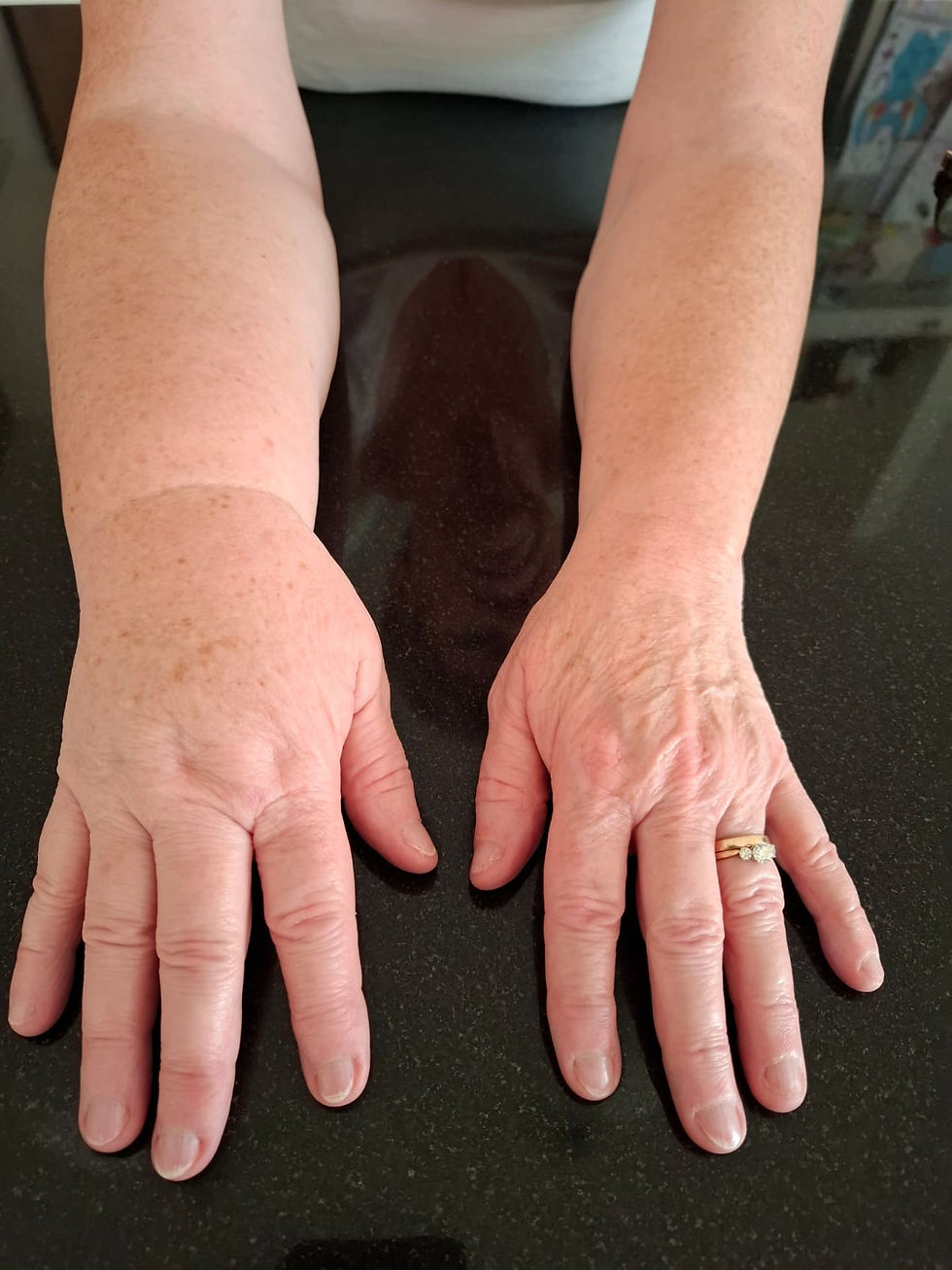Understanding Lymphoedema: The Hidden Disease That Needs Our Attention
- jemmabalmer3
- Sep 8
- 3 min read

Lymphoedema is often called "the hidden disease" – and for good reason. Despite affecting thousands of New Zealanders, particularly those who have undergone cancer treatment, it remains poorly understood and frequently goes undiagnosed until it significantly impacts a person's quality of life.
What is Lymphoedema?
The lymphatic system is one of the most complex systems in the human body. This network of channels, lymph nodes, and organs, maintains fluid balance by transporting nutrients and waste products throughout the body. It supports immune function and helps to fight disease. When this system becomes compromised – whether through surgery, radiotherapy, or other causes – lymphoedema can develop. If lymph fluid cannot drain properly, it builds up in tissues, and may cause persistent swelling and related complications.
Living with Lymphoedema
The impact of lymphoedema extends far beyond visible swelling. Patients often describe their affected limb as feeling numb, heavy, tight, or stiff. Simple daily activities become challenging as the skin thickens and coordination suffers. Many experience depression and anxiety as their independence is compromised.
One breast cancer survivor described the sensation as "feeling like holding
bagpipes under the arm".
The Importance of Early Intervention and Treatment
The progression of lymphoedema follows predictable stages, but early intervention can dramatically alter its trajectory. Modern diagnostic techniques can detect lymphoedema before obvious symptoms appear, when treatment is most effective.
Mary Thomson, a retired lymphoedema physiotherapist, said many patients “don’t even know what lymphoedema is, let alone how to manage it.”
Treatment typically involves a combination of approaches:
· Manual lymphatic drainage
· Self-massage techniques
· Skin care
· Appropriate compression garments
· Compression pumps
· Exercise programmes
The Hidden Challenges
Despite affecting up to 33% of breast cancer survivors according to some studies, lymphoedema faces significant challenges in terms of recognition and treatment access. The condition can develop at any time after cancer treatment, but most commonly within the first two years. Patients remain at risk for life, yet many healthcare providers lack specialised knowledge about its management.
Daily life becomes fraught with hidden risks. Simple activities like gardening without gloves, minor cuts or scratches, insect bites, or even sunburn can trigger flare-ups and lead to various infections. Garments and compression gear, critical for treatment, cost hundreds of dollars. Lymphatic pumps can cost $4,000, and the public system usually only provides garments and self care.
A Personal Approach to a Community Need
This is precisely why the Koed Lymphoedema Treatment and Research Support Fund represents such a vital step forward for Canterbury. Established from Karen Koed's personal experience with the condition, the fund addresses real gaps in accessible treatment and research.

Karen's journey from diagnosis through treatment to recovery illustrates both the challenges and possibilities inherent in lymphoedema management. With proper early intervention and ongoing care, she was able to return to her active lifestyle of dancing, tai chi, and movement activities. Her experience highlighted a crucial truth: lymphoedema doesn't have to be disabling when caught and treated early.
Kara Nowak is the specialist lymphoedema therapist in Christchurch who will lead the use of the fund for patient care. She has a PhD in oncology physiotherapy from Poland, specialising in pre- and post-operative breast cancer care. Kara is currently completing her Masters degree in Nursing at Canterbury University, so that she can expand her practice and push for systemic change.
Kara joined the St George’s Cancer Care team, after meeting Mary eight years ago, soon after Kara arrived in New Zealand with her family. She initially ran group exercise sessions for men with cancer, and gradually moved into working with Mary to provide full lymphoedema treatments.
The establishment of this endowment fund comes at a crucial time. Research over the past two decades has revolutionised our understanding of the lymphatic system, moving it from a neglected area of study to recognition as a vital component of human health. The fund will not just help breast cancer survivors, but people with primary lymphoedema (including children) and those with lipoedema – a related condition that is largely invisible to the public health system.
A Condition That Demands Attention
Lymphoedema may be called "the hidden disease," but it doesn't need to remain hidden. With proper support, research, and community awareness, we can ensure that conditions like lymphoedema are detected early, treated effectively, and managed successfully, allowing people to return to active, fulfilling lives during and after their cancer journey.
The Koed Lymphoedema Treatment and Research Support Fund represents more than charitable giving. As an endowment fund, it has been set up as a practical response to a real community need, ensuring that future generations of cancer survivors won't face the challenges of lymphoedema alone or without access to proper care.


